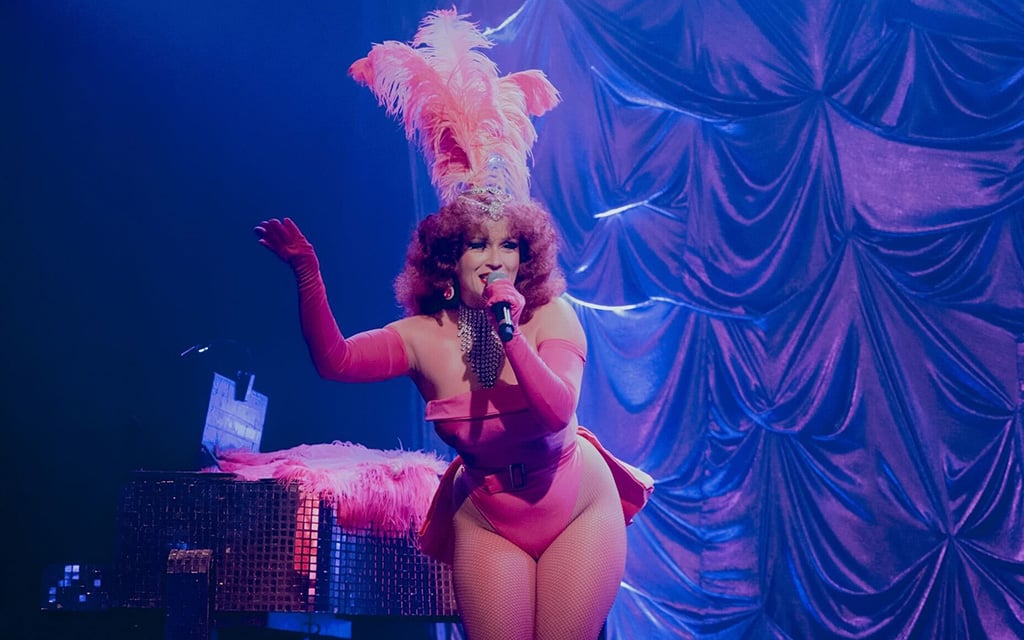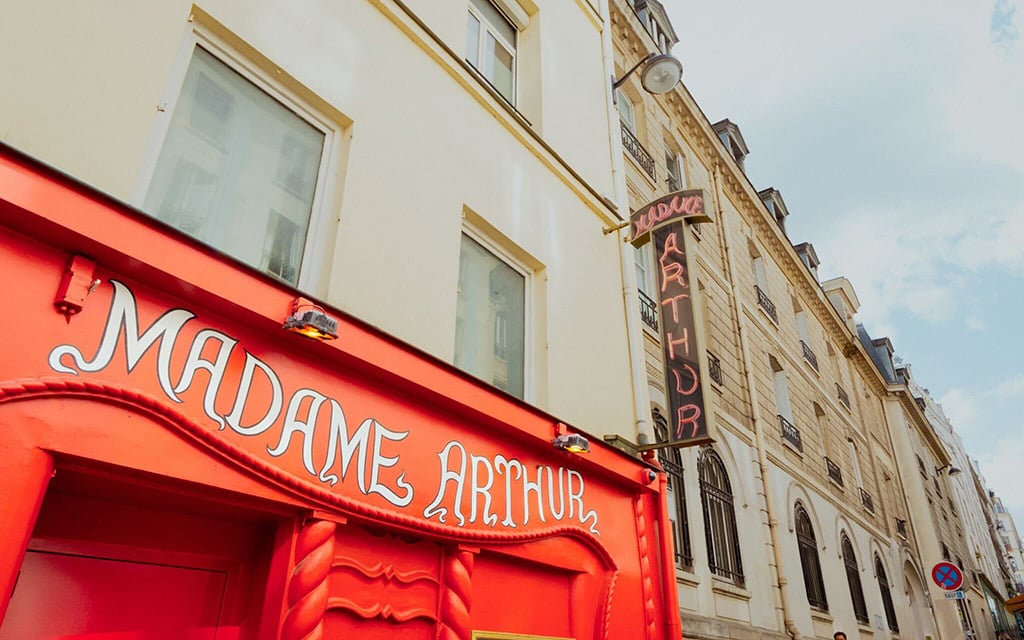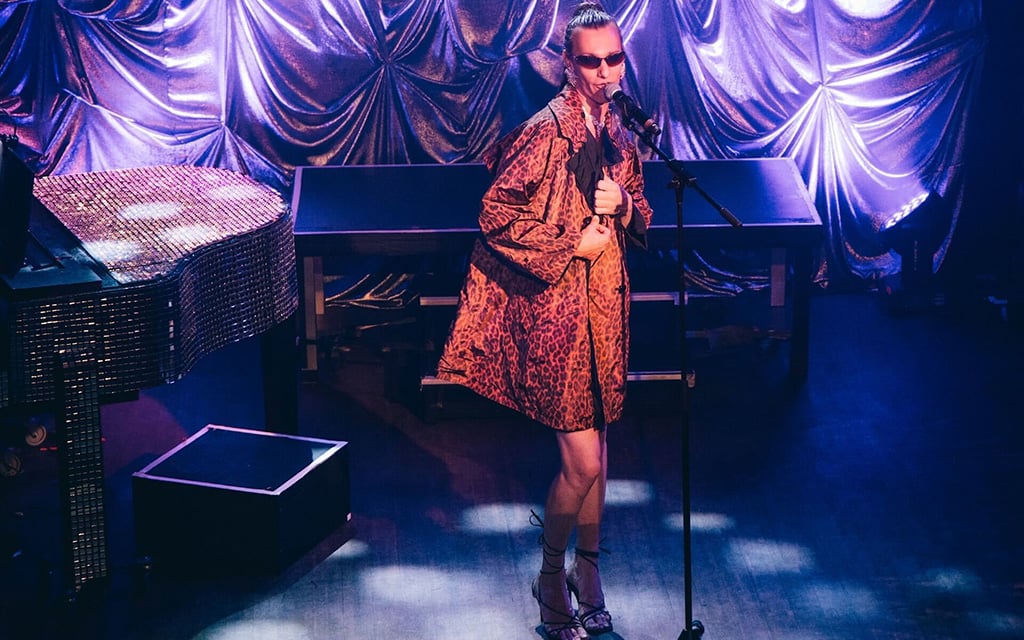
Cabaret performer Maud Amour captivates the audience during one of the many shows put on at the popular Madame Arthur Cabaret Club in Paris. (Photo by Savannah Bowie/Special for Cronkite News)

Madame Arthur, which opened in 1946, has since become the heart of nightlife in Paris’ own Pigalle district. (Photo by Savannah Bowie/Special for Cronkite News)
PARIS – A man painted entirely in blue sits on top of a lavish table, surrounded by people in extravagant, festive outfits. To many, the scene feels like a modern twist on a Dionysian feast, with everyone enjoying rich food and wine in a lively, joyful atmosphere that channels the spirit of the Greek god of celebration.
Others saw the recent Paris Olympics’ opening ceremony in a different light, suggesting it attacked Christianity and questioned its inclusion of drag queens in the event, prompting many in that community to come to the show’s defense.
“This is very French, to be provocative, because in France we read Voltaire literature and Enlightenment literature, which is always making fun of religion, making fun of the president,” said Lola von Flame, a performer at Madame Arthur, a renowned cabaret venue in Paris, who added that satire and challenging authority are important in French culture.
Will drag queens or other images that make light of Christianity be part of Sunday’s closing ceremony? Multiple reports suggest actor Tom Cruise may rappel down into the Stade de Franc, bu little else has been leaked about the Games’ final event.
The opening ceremony, intended to highlight the city’s rich cultural diversity and inclusivity, featured a vibrant display of Parisian culture. The ceremony was watched by 23 million people in France and rated successful by 86%, according to a Harris poll.
Madame Arthur cabaret holds a special place in the city’s nightlife. In the Pigalle district, it has a rich history of celebrating gender fluidity and LGBTQ+ culture. It is known for its cabaret that blends humor, music and theater, making it a beloved spot for locals and tourists.
“You’ve seen the blue man, Philippe Katerine, a very artistic and philosophic artist in France,” von Flame said. “We love him; everybody loves him in France. So it was very fresh to see him on this stage.”

Loa (Law of Attraction) Mercury performs for the audience at Madame Arthur cabaret. Many in the drag community offered support of the Paris Olympics’ opening ceremony. (Photo by Savannah Bowie/Special to Cronkite News)
The inclusion of drag and other elements sparked controversy among those who felt the performance was mocking Christianity and The Last Supper because a scene titled “Festivity seemed to depict Leonardo da Vinci’s painting of the event.
“There are many movies with (The Last Supper) reference, so many cartoons, like in ‘The Simpsons,’” von Flame said. “People are just saying it was blasphemed because of the drag queens.”
Thomas Jolly, the art director of the opening and closing ceremonies said, “That wasn’t my inspiration.” The scene was actually intended to represent the Greek god Dionysus, known as the god of feasting, wine and the father of Sequana, the goddess of the River Seine, he said, although some producers on the show have recently contradicted him.
Féréric Hocquad, the deputy mayor of nightlife in Paris, supported the inclusive approach of the ceremony, reinforcing the city’s identity as a harbor for freedom and diversity.
“In Paris, we are a place of liberty,” he said, “Lots of people come here because we are a city of permittivity, and that’s what we are fighting for in Paris. You can love everybody in Paris, be yourself. There’s no judgment of what you are.”
Hocquad is hopeful about the potential boost in tourism following the ceremony.
“People may come to Paris to see a special kind of cabaret, like queer cabaret or drag show cabaret,” he said.
Clara Brajtman, Madame Arthur’s artistic director, appreciated the colorful and inclusive nature of the ceremony and saw it as a tool “to promote something that is so typically Parisian”
She added, “That was really fun and colorful, and having fun with all of those historical moments, like the French Revolution, also admitting that all of these things run in our veins. They go through our blood, but you know, it’s things of the past that we have some distance from nowadays, but really embracing everything that is diverse in today’s society while having a lot of fantasy and a lot of fun with it.”
Von Flame acknowledges the mixed reactions but also offering a forward-looking view.
“I think people, you know, maybe it was a bit shocking. I can understand that people are not ready for that, but I think we’re going to laugh about that in 30 years and say, ‘Oh, look at the Olympic Games,” she said. “The opening with such a scandal at the time’ and we’re going to laugh about that in 30 years, which is that, you know, not everybody’s moving at the same time.”
Hocquad further highlighted the significant contributions of the LGBTQ+ community to Paris’ cultural life.
“The gay community has been a driving force in many creative movements in Paris, from cabaret to the early electronic music scene in the ’80s,” he said. “It’s important for us to support and nurture this creativity.”
While including drag queens in the Olympic opening ceremony has stirred controversy, it has also spotlighted Paris’ spirit of artistic freedom and inclusivity. The event has prompted a broader discussion on France’s evolving nature of cultural expression and acceptance.